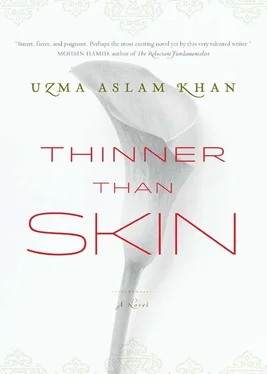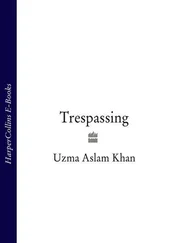At the edge of the bed, Maryam opened her eyes. There was a scraping on an outside wall. The dogs did not bark. If this was a knock, the men never knocked.
She waited. She could not identify the sound. She expected the curtain to part. It did not. Whoever was there began to walk away, his footsteps heavy. Or he was still there, and only pretending to leave, to draw her out. More likely, it was all in her mind, a place where too many pictures had lately played. Perhaps it was all a symptom of being trapped inside, like this, instead of moving under open skies, the way she always felt the most at peace.
Still she stayed inside, with the pictures.
She saw a figure walking in the night. Ghafoor was behind him. A cluster of village folk surrounded them. They were all there, the four who had been at the lake that day. It was late at night and the wind was relentless and the rain was worse. Ahead, a serrated spur of rock. The one she had seen three times already. The figure was walking toward the rock, because she knew it had to be just so, she had made it this way. So had the Queen and her lover. So had her mother. So had Kola and Namasha and Noor. So had Maryam Zamani and Kiran and the unnamed thousands who had passed through this valley, or stayed, without committing murder. She could feel the peace slipping away as surely as the long wooden paddle through her fingers. Nothing stuck to her skin anymore, not a paddle or a teat, not sweat, not butter. It was all slipping away.
It began to rain, the same vicious rain that ripped through the man’s jacket as she watched him set his first foot high on the rock. He had a red dot on his forehead, this man. Like a bindi, or a ruby. What kind of man decorated himself like a woman? The rain did not wash it off, no matter how emphatically it lashed his skin. No matter how near it came to her hut. The first torrent of the season, drowning out the sound of boots stomping outside.
Quietly, she began to scoop the butter onto a board, before adding the salt. Quietly, she watched it melt.
With the rain came more mosquitoes and flies and the mare Namasha turned her indignation inward. She continued to cast judgment at Maryam with the ferocity of her gaze, but she now refused to walk herself into the forest. Nor would she allow herself to be walked, even with one wrist. Nor would she accept the maize Maryam cooked for her every morning with extra salt to help with her digestion, though salt was growing scarce. She was on a hunger strike, and hunger made her gnash her teeth. Her daughter, Loi Tara, was learning the price of loyalty to the womb. Did it have to mean starvation?
For the first two days after the rain began to flog them, each time Maryam clicked her tongue and pulled the rope, Loi Tara galloped forward eagerly, before curtsying back to Namasha. “Don’t be a donkey!” Maryam shouted over the rain. “You are a growing child!” Loi Tara would nuzzle her mother and shake her head at Maryam and shiver in wretchedness under a shelter of graveyard cypress. Namasha would wind her neck around her daughter once before standing upright again, daring Maryam to intercept.
The third day, Maryam took the dare. She went into the forest and brought back something even more tempting than an egg from a sedentary farmer. A peach, covered in golden down with a blush of crimson. There was no hesitation. Loi Tara burrowed her sweet lips in Maryam’s palm. Namasha bucked her once. Loi Tara did not stop eating.
The fourth day, the filly scampered toward Maryam as soon as their eyes met, and once untethered, bounded into the forest. “Will you not follow us?” pleaded Maryam. Namasha gnashed her teeth.
Maryam caught up with the filly, who had found the buffalo Noor at a papra plant, wrapping soft lips around lacy leaves. Loi Tara looked momentarily perplexed: where were the peaches? In truth, Maryam had plucked the peach from a fruitseller, in exchange for butter, and planted it in the forest before bringing it forward to the filly’s ready nose. Now she stroked her smooth, velvety neck, the color of egg yolk in the setting sun, murmuring, “Silly, peaches grow in orchards forbidden to you. And little horses don’t eat papra leaves.” She untangled the wet mane with her fingers. “How to bring your mother back?” Loi Tara nodded, nuzzled, and forgot. She began plucking the tall grass at Maryam’s feet.
The forest dripped with rain. She looked at it: her forest. The slender stems of the kakwa fern glistened jet and violet, glossy emerald fronds tossed as proudly as the filly tossed her mangled mane. In the past, when Kiran complained of toothache, a malady she was prone to, Maryam had boiled those fronds and left the water to cool. Kiran would sip it later, her pain gradually subsiding. In the past .
Maryam pulled Loi Tara further into the forest. Around them towered blue pine and long-leaved pine, branches whorled, cones at her feet. Closer to the soil, the small, pink flowers of the khatambal. She could not remember the last time she had seen these. The herb flowered only during the monsoons, when they were in the mountains. She let the filly tear apart the bloom.
She could hear thunder. The buffalo bulls of the goddess clashing their horns. That was how thunder used to be known, in her grandmother’s day, even her mother’s. When the goddess’s bulls were at war, so was the world. Maryam stepped inside a canopy of chir, a warm, dry canopy, where nothing could find her. Not even the rain.
Inside her canopy, she contemplated the life hers had become. Earlier this morning she had stayed in bed, as had become routine, with a listlessness coated in dread. Would policemen bother them? Or would it be plainclothesmen today? Neither had come; she still had to force herself out of bed. It seemed the only thing pulling her into the world was the battle with her horse. That was the power of the occupation: whether the men showed or not, they now resided in their home, just like the news, on a multitude of legs. They could appear at any time. They were already there — behind the curtain, beside the teacups, in the weave of her bed. No one could hide, though they kept on trying. She mostly stayed inside her hut, worse, she stayed inside herself, in a way of life she knew she could never grow used to, even as it became routine.
At night, when she listened through the wall, she heard the men and their radio. When they rolled the dial they could catch the voice of the mullah arrested three years ago, for fighting America in Afghanistan. Though still in jail, he had supporters in Swat, and even closer, in Mansehra. The same men setting up camp around Balakot, and pushing into their huts? She did not know. The voice on the radio always said radio was sin. TV, computers, cinema — all, sin. In Naran, there were stores with computers; her son knew all about them. But the radio? That was not so new, and Maryam could hear the men roll the dial, as her own father had done, to catch the news as far away as Peshawar. There was the mullah, cursing the radio he was inside, promising that soon this would be a Country of God, with no music, no dancing, and with madressahs in every valley. To fulfill the dream, they needed the local boys.
Through the wall she could hear her husband vow that it would take the hand of God to make the valley surrender to these men. A flood. Or an earthquake.
Inside the canopy inside her forest, Maryam continued stroking Loi Tara. The filly was back to nuzzling the buffalo. Maryam’s eye fell on a drop of rain rolling to the lip of a leaf Noor had missed. The drop halted just at the lip. The leaf seemed to curl, holding it in.
If that drop of rain were her son, how long could she hold him?
This morning, after milking the buffalo, he had told her he wanted to be a trader, like his uncle Ghafoor. He did not want to be like his father, a mere herder. He wanted Ghafoor’s clothes, the trousers with silver belts. He wanted to barter jade and leather, not milk and butter. He wanted to travel, outside the valley, outside the mountains, even. But he had a soft temperament, her son, more like his father than his uncle. And he was impressionable. If yesterday he would rather be a forest inspector, and today, a trader, what would it be tomorrow? A “local boy” in a camp — even if the locals themselves did not consider Gujjars local?
Читать дальше












